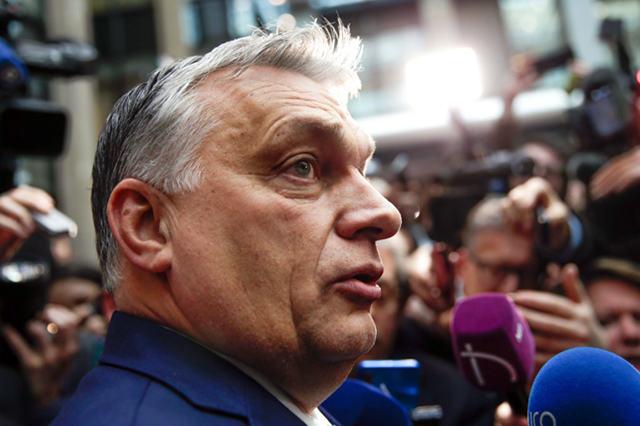You are here
EU wants to suspend Hungary financing as it awaits reforms
By AFP - Sep 19,2022 - Last updated at Sep 19,2022
BRUSSELS — The European Union's executive arm on Sunday proposed suspending 7.5 billion euros in financing for Hungary, as it awaited potential "game changer" anti-corruption reforms from Budapest.
Hungarian Prime Minister Viktor Orban's government also came under renewed fire for its close ties with Moscow, accused of having dragged its feet on freezing Russian assets since the invasion of Ukraine.
The European Union and Hungary have been at loggerheads for months, with Brussels suspecting the government led by nationalist leader Orban of undercutting the rule of law and using EU money to enrich its "cronies".
The European Commission's budget commissioner, Johannes Hahn, told journalists on Sunday that the EU's executive had proposed suspending funding "amounting to (an) estimated amount of 7.5 billion euros ($7.5 billion)".
On Saturday, Hungary's government said that MPs would vote next week on a series of laws aimed at easing the conflict.
The measures are expected to include setting up independent anti-corruption watchdogs to monitor the use of EU funds as well as steps to make the legislative process more transparent.
Hahn said he was "very confident that... we will see significant reforms in Hungary, which indeed will be a game changer".
Hungary had committed to "fully inform" the commission about implementing measures to address their concerns by November 19, he added.
'Trojan horse'
Poland — another eastern EU member accused of flouting the rule of law — said it would fully oppose any measure depriving Hungary of the funds.
Nationalist Prime Minister Mateusz Morawiecki told journalists on Sunday that such a move would be "absolutely unauthorised".
The EU's Justice Commissioner Didier Reynders added to the tensions between Brussels and Hungary on Sunday as he said the government's friendliness with the Kremlin was potentially behind its foot-dragging on implementing anti-Russian sanctions.
Reynders said that while the bloc had frozen assets worth 14.5 billion euros following Russia's invasion of Ukraine, Hungary had only contributed just over than 3,000 euros to the total.
"We must put a lot of pressure" on Hungary because "we can assume that its very close ties with Russia are perhaps preventing it from acting", he told television channel LCI.
In Ukraine meanwhile, presidential advisor Mykhaylo Podolyak described Hungary as a "Trojan horse seeking the collapse of [the] EU at the expense of European taxpayers".
"Let's call a spade a spade... Orban hates Ukraine and dreams of [a] 'Russian world' in Europe. Should [the] EU finance these diversions?" he wrote on Twitter.
Orban's administration has struck a more emollient tone towards Brussels recently.
Justice Minister Judit Varga reacted to the Commission's proposal by acknowledging that "we still have work to do" to end the row, while insisting: "We are moving in the right direction.
"We are working to ensure that the Hungarian people receive the resources they are entitled to!" Varga commented on her Facebook page Sunday.
Tibor Navracsics, the Hungarian minister in charge of negotiations with the EU, told reporters on Sunday he was confident that "we can conclude these negotiations before the end of the year and sign the related agreements" to enable the release of the funds.
But German MEP Daniel Freund said that although the freezing of funds to Hungary was not enough to "stop Orban and his cronies from stealing EU funds".
"Those are good measures, and they should be adopted, but they are not sufficient to stop corruption, let alone to make Hungary a functioning democracy," he said.
French European Parliament member Valerie Hayer tweeted that this was the "last chance" for Orban.
"The time for discussions is over," she said.
The final decision on the proposal will be taken by the EU Council.
Gergely Gulyas, Orban's chief of staff, told reporters on Saturday that MPs would vote within days on measures designed to allay concerns about graft and a lack of transparency in public procurement.
The conciliatory move from Budapest comes as the Hungarian economy faces increasing pressure from a weakening local currency and fast-rising inflation. Both have hit new records this year.
On Thursday, the European Parliament declared that Hungary was no longer a "full democracy" a symbolic vote that infuriated Budapest.
Related Articles
BRUSSELS — The European Union criticised Hungary and Poland in its first report on democratic standards across the bloc on Wednesday, as ten
BUDAPEST — The EU Court of Justice dismissed on Thursday a technical challenge by Hungary of a decision to probe Budapest's alleged "seriou
BUDAPEST — Hungary's parliament endorsed a bill on Monday giving nationalist premier Viktor Orban sweeping new powers he says he needs to fi













